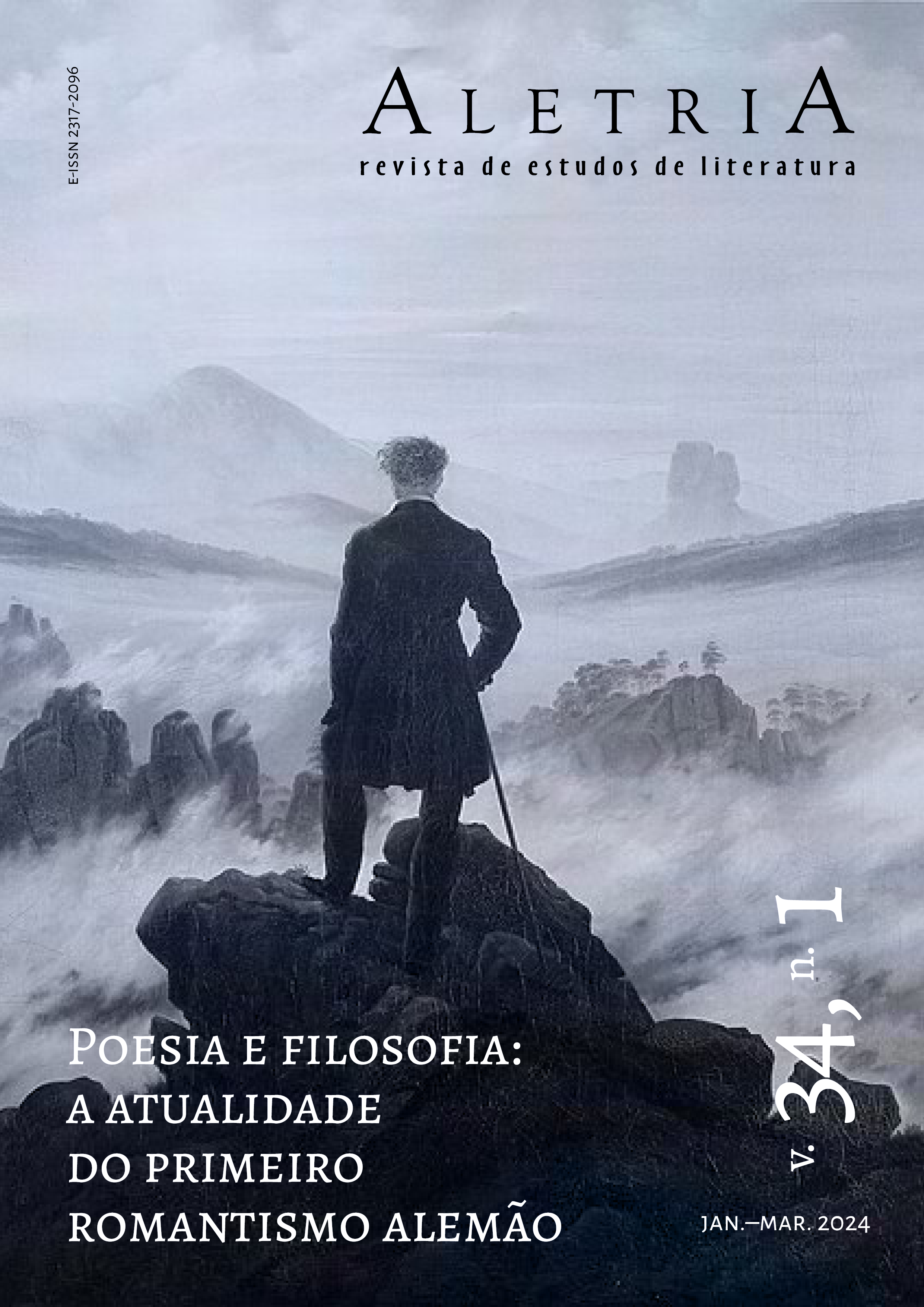The Concept of Originality at the Origins of Romanticism
an Analysis of “On German Architecture” by the Young Goethe
Keywords:
originalidade, origem, gênio, romantismo, GoetheAbstract
The aim of the article is to present an interpretation of the origins of Romanticism based on the emergence, in the transition from the 18th to the 19th century, of the concept of originality applied to artworks. To achieve this goal, we divided the article into three parts. First, we will demonstrate how, in the late 18th century, the empiricist problem of taste judgment challenged the rational concept of beauty inherent in the neoclassical tradition. Next, we will examine how this crisis is addressed in Edward Young’s essay, Conjectures on original composition, through the formulation of an organic criterion for evaluating artworks. Finally, we will show how the young Goethe, in his essay “On German architecture”, develops a reversal of Platonic assumptions that will be passed down to the early German Romanticism.
Downloads
References
ABRAMS, Meyer Howard. O espelho e a lâmpada: teoria romântica e tradição crítica. Tradução de Alzira Vieira Allegro. São Paulo: Editora Unesp, 2010.
AGAMBEN, Giorgio. O homem sem conteúdo. Tradução de Cláudio Oliveira. Belo Horizonte: Autêntica, 2012.
ARISTÓTELES. Poética. Tradução de Ana Maria Valente. Lisboa: Fundação Calouste Gulbenkian, 2008.
BATTEUX, Charles. As belas-artes reduzidas a um mesmo princípio. Tradução de Natalia Maruyama e Adriano Ribeiro. São Paulo: Humanitas: Imprensa Oficial do Estado de São Paulo, 2009.
DOBRÁNSZKY, Enid Abreu. No tear de Palas: imaginação e gênio no século XVIII – uma introdução. Campinas: Papirus: Editora Unicamp, 1992.
FOUCAULT, Michel. As palavras e as coisas. Tradução de Salma Tannus Muchail. São Paulo: Martins Fontes, 2007.
GOETHE, Johann Wolfgang von. Escritos sobre arte. Tradução de Marco Aurélio Werle. São Paulo: Imprensa oficial: Associação Editorial Humanitas, 2008.
GOETHE, Johann Wolfgang von. Fausto: uma tragédia – segunda parte. Tradução de Jenny Klabin Segall. São Paulo: Editora 34, 2013.
GOETHE, Johann Wolfgang von. Os sofrimentos do jovem Werther. Tradução de Marcelo Backes. Porto Alegre: L&Pm, 2011.
HUME, David. Do padrão do gosto. In: DUARTE, Rodrigo (org.). O belo autônomo: textos clássicos de estética. Belo Horizonte: Autêntica, 2012. p. 89-114.
KANT, Immanuel. Crítica da faculdade de julgar. Tradução de Fernando Costa Mattos. Petrópolis: Vozes; Bragança Paulista, SP: Editora Universitária São Francisco, 2016. (Coleção Pensamento Humano)
PLATÃO. A República. Tradução de Maria Helena da Rocha Pereira. Lisboa: Fundação Calouste Gulbenkian, 2014.
PLATÃO. Fedro. Tradução de Carlos Alberto Nunes. Belém, PA: Edufpa, 2011a.
PLATÃO. Íon. Tradução de Cláudio Oliveira. Belo Horizonte: Autêntica, 2011b.
PLATÃO. O banquete. Tradução de José Cavalcante de Souza. São Paulo: Editora 34, 2016.
WINCKELMANN, Johann Joachim. Reflexões sobre a arte antiga. Tradução de Herbert Caro e Leonardo Tochtrop. Porto Alegre: Movimento, 1975.
YOUNG, Edward. Conjectures on original composition. Manchester: Manchester University Press, 1918.
Downloads
Published
How to Cite
Issue
Section
License
Copyright (c) 2024 Gabriel Victor Rocha Pinezi (Autor)

This work is licensed under a Creative Commons Attribution 4.0 International License.
Authors who publish with this journal agree to the following terms:Authors retain copyright and grant the journal right of first publication with the work simultaneously licensed under a Creative Commons Attribution Non-Commercial No Derivatives License that allows others to share the work with an acknowledgement of the work's authorship and initial publication in this journal.Authors are able to enter into separate, additional contractual arrangements for the non-exclusive distribution of the journal's published version of the work (e.g., post it to an institutional repository or publish it in a book), with an acknowledgement of its initial publication in this journal.Authors are permitted and encouraged to post their work online (e.g., in institutional repositories or on their website) prior to and during the submission process, as it can lead to productive exchanges, as well as earlier and greater citation of published work (See The Effect of Open Access).





